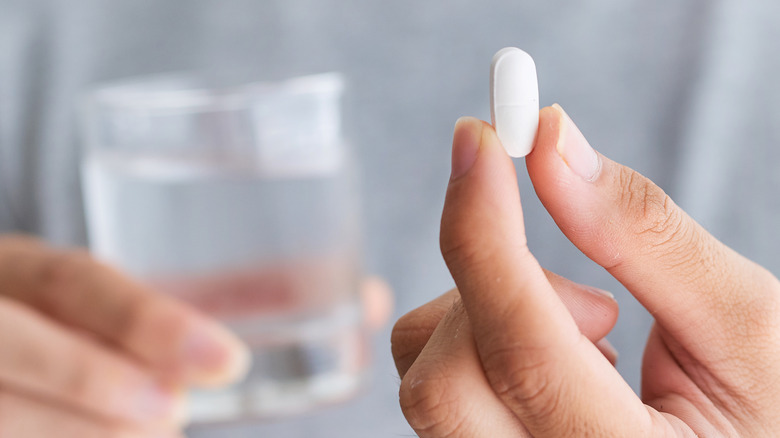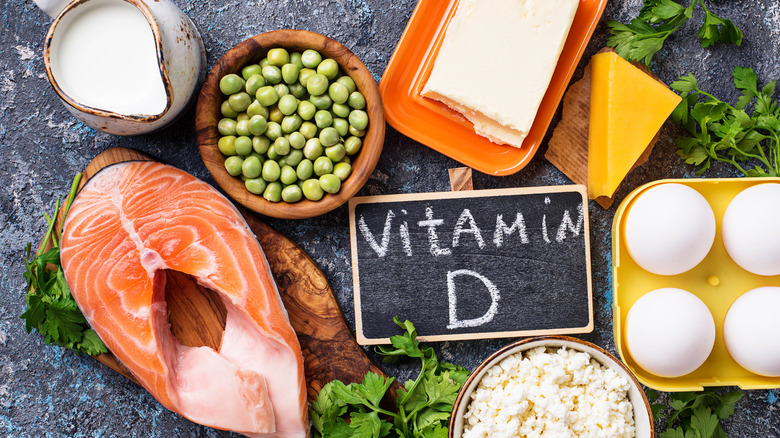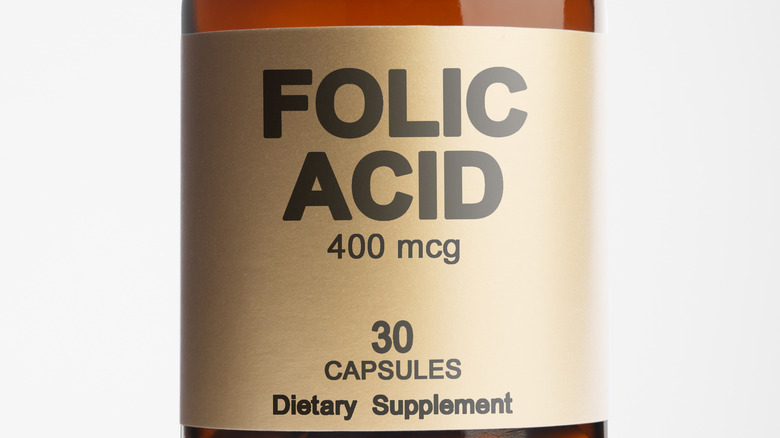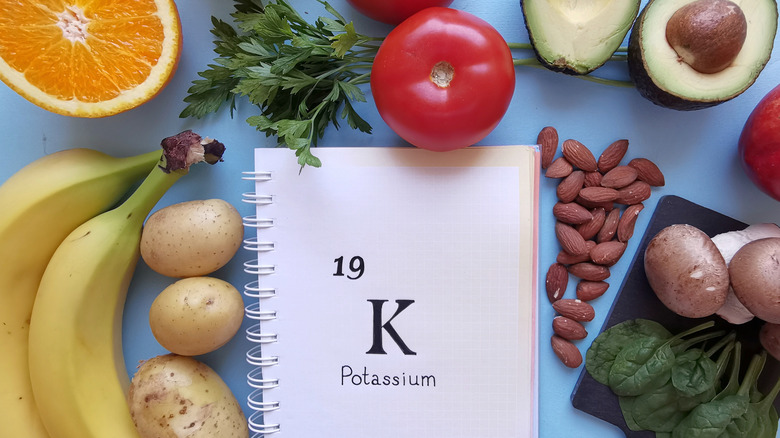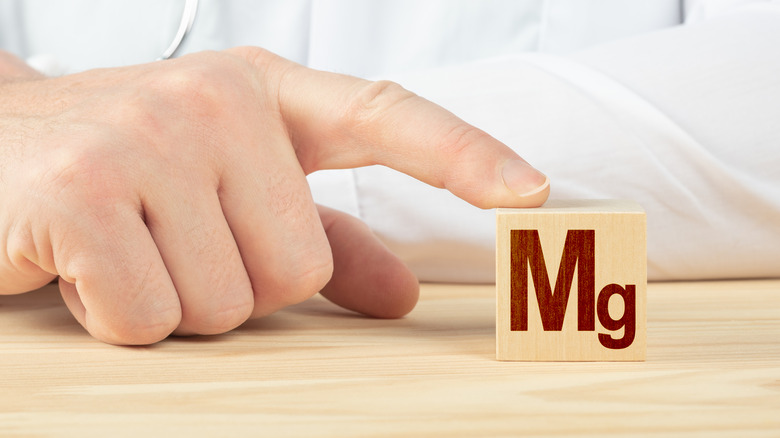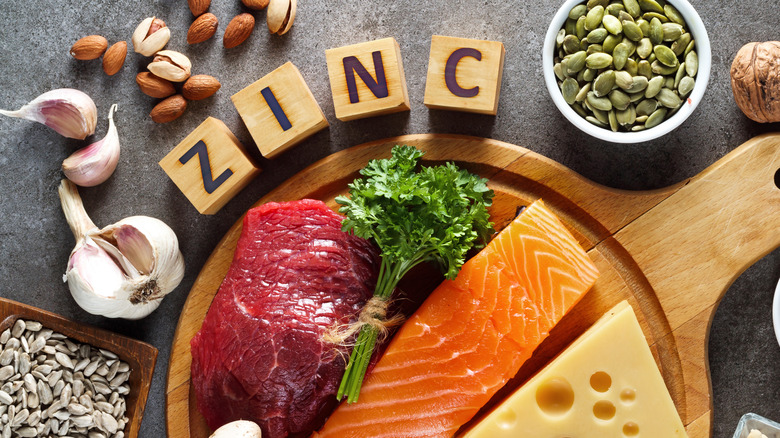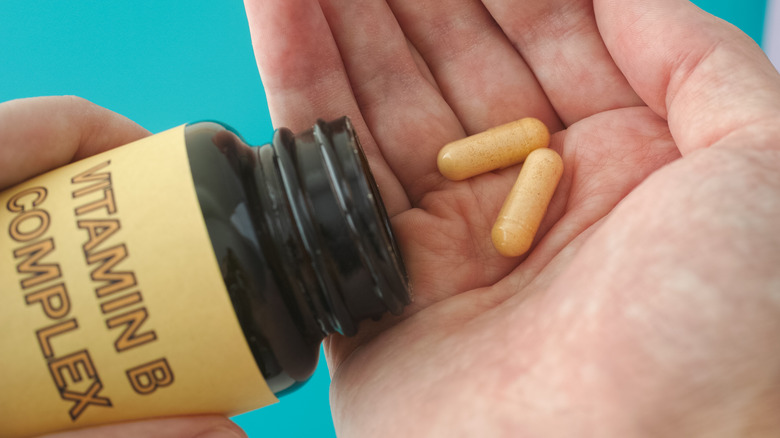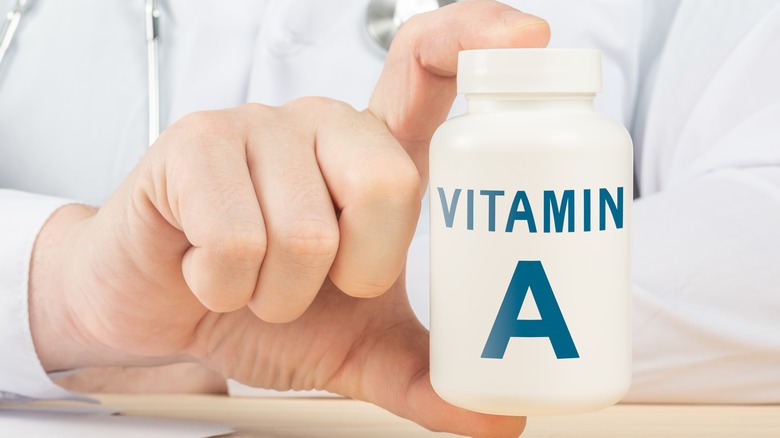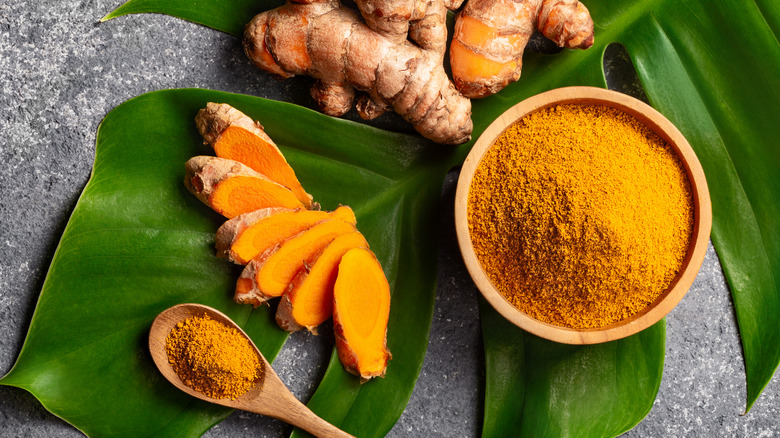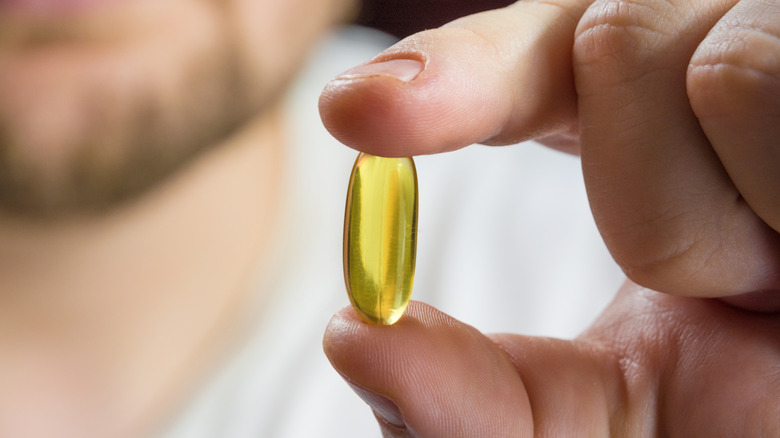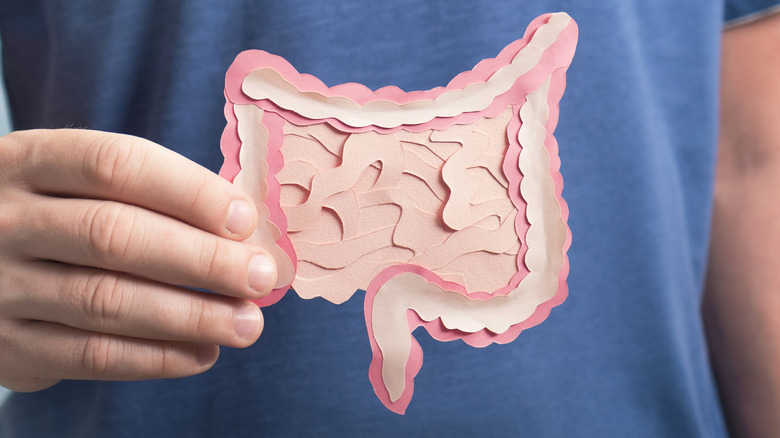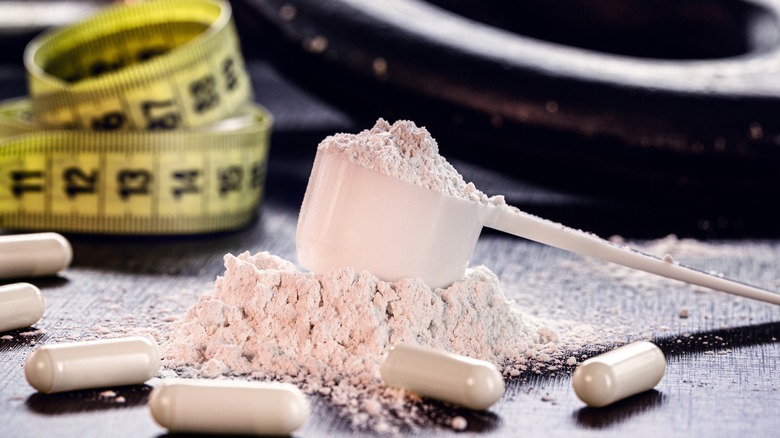Vitamins And Supplements Men Need To Get Every Day
For those who are new to the world of vitamins and supplements, it can no doubt be dizzying. There is an abundance of information in the market about what's good for you and what's not good for you, and it seems like data is being updated almost every other week about the latest "it" supplement. Furthermore, because men and women are biologically different, we each have different needs when it comes to vitamins and supplements, which can seem to further confuse matters.
While in theory we should be getting all of our vitamins and nutrients from food, according to a study published by Oregon State University, 75% of Americans are falling short of the daily recommended intake of fruit. Meanwhile, 80% fall short of the recommended vegetable intake. The study claims this lack of fruits and veggies can lead to significant micronutrient deficiencies, which can cause long-term health consequences like cancer, heart disease, and diabetes.
According to Healthline, for men, their vitamin and supplement needs will vary depending on their age as well as their health concerns. If you want to up your nutrient intake, continue reading to learn about 14 of the most important vitamins and supplements that men need to stay healthy.
Vitamin D
Also known as the sunshine vitamin, Vitamin D is a powerhouse nutrient that supports a variety of functions including cognitive performance, heart health, mood and more.
To start, a study published by The Journal of Neurology, Neurosurgery, and Psychiatry evaluated 3,133 men and discovered that those who had low vitamin D levels also suffered from poor performance on tests that measured cognitive performance. Furthermore, if you want more defined six-pack abs, vitamin D may also support you in your efforts. A study published by Therapeutic Advances in Chronic Disease found a positive correlation between vitamin D intake and muscle strength of the lower legs, as well as "body sway" and physical performance in adults over the age of 50. Not bad — but the good news doesn't stop here, guys.
For those who want to flash a set of gorgeous pearly whites along with those six-pack abs, vitamin D can support you in those efforts as well. According to a study published by The Journal of Archaeological Science, a deficiency in the vitamin has been linked to gaps in dentin, which is the structure of the tooth underneath the enamel.
Folic acid
While folic acid may be more well-known for its benefits to pregnant women, men have not been excluded from the myriad benefits this important nutrient has to offer.
According to Healthline, while folic acid and folate are often understood to be the same thing, they are actually different in their makeup. The site explains that folic acid is the synthetic version of folate, and that the structure and biological effects of folic acid are different from those of folate. Some of the potential benefits of increasing your intake of folic acid include helping with depression, benefitting heart health, and improving male fertility. Experts at Healthline explain that 16% of men are affected by mental health disorders in the U.S.
A study published by the Journal of Psychiatric Research found that those who dealt with depression had lower levels of folate than those who did not. Regarding heart health, according to Healthline, heart disease results in the death of one out of every four men in the U.S., and folate can help manage one of the amino acids that is responsible for causing it. Furthermore, it has also been shown to reduce blood pressure.
Protein
Protein is definitely having a moment, with diets such as paleo and keto shedding a spotlight on the importance of this nutrient in building muscle and reducing fat. While it may be easy enough to get protein from meat, for men who might be vegetarian, vegan, or are simply cutting back on their meat consumption, protein supplements can be a solid, and often tasty, alternative.
According to Healthline, research has shown that in order to build muscle and lose fat, Americans need to up their protein consumption based on what is currently recommended by the government's Food & Nutrition Board. Protein powders are an easy way to incorporate more protein into your diet, and experts at Healthline list whey protein powder, which is a dairy-based option, as one of the top methods. According to the site, it contains all nine amino acids that are required by the body, is "quickly digested and easily absorbed by the body," and helps to build muscle while aiding in muscle recovery. If you are vegan or looking to cut back on dairy, the site recommends pea protein as one of the top plant-based proteins available. It also contains all nine amino acids, and can assist in increasing muscle mass and strength, similar to whey.
Potassium
At some point, it was drilled into the collective consciousness that if you wanted to up your potassium, you needed to eat a bunch of bananas. While that's great and all, did anyone ever stop to ask what potassium really is, and why we actually need it?
Well, here's the scoop. According to Healthline, potassium is the "third most abundant mineral in the body," and is technically an electrolyte because of its high reactivity in water. Experts at the site explain that it can assist with water retention, and even guard against stroke. If you're not a fan of bananas or are just looking to diversify your potassium sources, experts at Men's Health explain that potassium can also be found in starchy vegetables, beans, peas, and fruits.
For older men, potassium can also help strengthen bones and help prevent bone loss. Furthermore, a study published by the American Heart Association showed that men suffer from higher blood pressure than women of the same age. Fortunately, however, according to experts at Healthline, potassium can help lower blood pressure by reducing the amount of sodium in your blood thanks to its capacity as an electrolyte.
Magnesium
Magnesium is another powerhouse mineral that drives a number of our daily functions. According to Healthline, magnesium falls right behind potassium as the fourth most abundant mineral in the body. However, many people are not reaching their daily recommended intake.
Heidi Moretti, MS, RD, a registered dietitian from Missoula, Montana spoke to Eat This, Not That and explained more about this vital mineral. "If there is one mineral almost everyone needs, it is magnesium. Some research suggests that 70 percent of Americans fall short. This may lead to digestive issues, poor sleep, mood swings, and increased risk of heart disease," she explained to the outlet. Dr. Anthony Kouri, an orthopedic surgeon at the University of Toledo Medical Center, added that for men, the benefits of magnesiun are particularly important because of its connection to the production of testosterone. "Most men begin to experience a decrease in testosterone around age 30. With loss of testosterone comes decreased stamina, loss of muscle mass and lower energy levels. Research has shown that magnesium supplementation increases testosterone levels and lowers men's risk of developing cardiovascular disease."
If that's not enough, other benefits of magnesium include improved exercise performance, fighting depression, and lowering blood pressure, according to Healthline.
Zinc
Zinc is another highly important mineral for men that is connected to the production of testosterone. While the broad benefits of zinc (which include assisting your immune system, assisting in metabolic function, and healing wounds) are important for both men and women, its benefits in the male body are extremely important (via Mayo Clinic).
According to Healthline, erectile dysfunction (ED) is one of the top sexual concerns for men, and studies have shown a direct correlation between ED and zinc deficiency. While the site explains that it is possible to get the recommended value of zinc through one's diet, it's also possible to fall below that value due to certain factors such as having gastrointestinal issues or eating a vegetarian or low-protein diet.
A study conducted by the Department of Internal Medicine at the Wayne State University School of Medicine intentionally deprived male subjects of zinc, testing their testosterone levels before and after, and discovered that testosterone levels had lowered by at least 75% after zinc deficiency was induced. According to Healthline, taking zinc supplements can be an effective way to treat erectile dysfunction, and the site suggests it can actually either replace medications like Viagra or enhance their effectiveness.
Vitamin B12
You may have heard your favorite celebrity talking about the benefits of a vitamin B12 shot, or better yet, a B12 infusion, but how much do you actually know about this super nutrient?
According to Healthline, B12, also known as cobalamin, is essential to our body's functioning, and is something our bodies cannot make on its own. B12 can be found in animal products (think meat, eggs, and dairy), and has also been added to food products such as cereals, according to more reports from Healthline.
While Healthline reports that B12 deficiency is common across the board, studies have also shown that the deficiency is more common in men than it is in women. A report published by the Annals of Nutrition and Metabolism showed that of almost 8,000 people tested, 25% more men were seen as deficient in the vitamin compared to women. Furthermore, another study published by the journal Andrologia discovered a connection between vitamin B12 deficiency and erectile dysfunction. It found that the amino acid homocysteine was present in higher amounts in men with B12 deficiency, which is associated with erectile dysfunction.
Vitamin C
Vitamin C has a reputation of sorts when it comes to preventing sickness and fighting off the common cold. Sorry to have to break the news to you, but while there is some truth to its immunity-boosting effects, experts say the rep it gets for curing disease might be a little, well...exaggerated.
Sari Greaves, RD, spokesperson for the American Dietetic Association and Nutrition Director at Step Ahead Weight Loss Center in New Jersey, spoke to Men's Journal to dispel a few commonly held vitamin C myths. "Vitamin C has developed celebrity status with claims that it can prevent or cure the common cold...For colds, extra vitamin C may have a mild antihistamine effect, perhaps shortening the duration of a cold and making the symptoms more mild," she explained. Symptoms of vitamin C deficiency include dry skin, slow healing wounds, and overall poor immunity (via Healthline).
For men who are looking to increase muscle production, aka "bulk up," vitamin C is known to help increase iron absorption, which can lead to improved muscle growth (via Healthline). Vitamin C can mostly be found in foods like chili peppers, kale, kiwis, and broccoli, according to another Healthline article.
Vitamin A
Vitamin A may be one of the lesser-known nutrients on the list, but its impact on your overall health is impressive nonetheless.
According to Healthline, vitamin A is a fat-soluble nutrient that is actually a combination of three different compounds. It can be found in animal products and fruits and vegetables, and can also taken via supplements, according to experts at the site. It is perhaps most known for its role in eye health (remember being told to eat your carrots to improve your vision?), but is also great for skin, lungs, intestines, and inner ears.
In other, perhaps more interesting news, vitamin A has been discovered to play a key role in male fertility. A study published by The American Society of Clinical Investigation confirmed that vitamin A is critical in the production of sperm, and a lack of the vitamin could be linked to infertility in men. Sarah Currie, a registered dietitian and personal trainer for Physical Equilibrium LLC. in New York City, spoke to Men's Health and explained that most vitamin A needs can be met through food, and that the daily recommended dietary allowance for adult males is 900 micrograms. "A balanced diet can keep a man safe from toxicity and deficiency—and supplementation shouldn't be necessary," she explained.
Cucurmin
By now you have probably heard of turmeric, the brightly hued yellow spice that is typically known to grace flavorful dishes, and whose origins stretch back thousands of years for its use in cooking and medicine (via Healthline). However, did you know that the main ingredient in turmeric, cucurmin, is what actually gives this spice its powerful healing effects?
Cucurmin makes up an almost negligible percentage of turmeric, which is why reaching for a supplement may actually be your best bet if you want to reach the daily recommended value of the ingredient. Per the experts at Men's Journal, cucurmin can be particularly good at reducing inflammation in the body, which is great for healing muscles post-workout. However, experts at the site explain that cucurmin is not very easily absorbed by the gut on its own, and needs some assistance in order to be fully digested in the form of either black pepper or fat.
If you do decide to cook with it, the site recommends preparing turmeric with avocado, chicken, or coconut oil and black pepper to improve its bioavailability. If you decide to take a supplement, be sure to pair it with "piperine," or find a supplement that already contains piperine.
Fish Oil
Fish oil is another well-known supplement that's seen a lot of public interest in recent years for its high content of omega-3 fatty acids, which are known for their heart healthy benefits, according to Medical News Today. Experts at the site explain that fish oil is typically derived from fatty fishes including mackerel, tuna, and herring.
While it's possible to get enough omega-3s from regularly eating fish, for those who do not, supplementation may provide the necessary quantities. According to Healthline, fish oil is composed of 30% omega-3 acids, eicosapentaenoic acid and docosahexaenoic acid, which the body is unable to make by itself.
For men, new research has discovered that there may be a positive correlation between the consumption of fish oil and improved fertility. A 2020 study published by the Jama Network that tested 1,679 men found that those who took fish oil supplements "had larger testes, higher semen volume, and higher cubic root transformed total sperm count" when compared to those who didn't. Furthermore, the omega-3s found in fish oil are known to lower triglycerides and blood pressure, which can help prevent heart disease, the number one cause of death of men in the U.S. (per Medical News Today).
Probiotics
If you feel like you've been hearing the word "probiotics" tossed around more often as of late, you aren't imagining it. According to a report published by Allied Market Research, the probiotic market was valued at $34.1 billion in 2020, and is expected to increase to $73.9 billion by 2030, representing a growth of 8.6%. So what's all the fuss about?
Healthline says that more evidence is appearing that the balance of "good" and "bad" bacteria in your gut is linked to a number of health concerns. Consuming probiotics aims to correct any imbalances, thus leading to improvements in health. Issues caused by an imbalance of bacteria in your gut include digestive problems, mental health issues, and obesity, among others.
Furthermore, studies have shown that consumption of probiotics has been linked to improvements in patients with depression and mental health concerns. Per Healthline, mental health issues are a significant concern for men. One study published by the Journal of Neurogastroenterology and Motility showed that people who consumed probiotics regularly for four weeks saw significant improvements in anxiety, depression, obsessive-compulsive disorder, and more.
Electrolytes
When you think of electrolytes, the first thing that probably comes to mind is an athlete guzzling down a bottle of Gatorade after a long marathon. However, that isn't the only way to get the job done. Ryan Maciel, R.D., C.S.C.S., a dietitian in Cambridge, MA, spoke to Men's Health and explained that for most folks, "the best way to obtain electrolytes is through a well-balanced and nutrient-rich diet."
As previously mentioned, electrolytes serve a number of functions in the human body, including balancing fluids and helping with nerve and muscle function. Men who are working out regularly between 60 and 90 minutes a session are probably losing a significant amount of electrolytes, which can cause fatigue, nausea, headaches, and even seizures, according to the site.
Kim Schwabenbauer, a registered dietitian and founder of Fuel Your Passion, also spoke to Men's Health about the importance of replenishing electrolytes. "Sodium is the primary electrolyte lost via sweat. Therefore, its losses are of greatest concern for those who work out. Its primary role is to assist with helping the body retain fluid and prevent cramping." Experts at the site list broth-based soups, pumpkin seeds, and Greek yogurt among the foods that are highest in electrolytes.
Creatine
For men who spend most of their time in the gym and are really serious about muscle gain, you may have already heard of this supplement. According to Healthline, it is the number one supplement to improve performance at the gym.
For those not in the know, creatine is a nutrient that is naturally produced in muscles, and can help the muscles achieve "explosive" bursts of energy during high intensity training or weight lifting. It is a mainstay among bodybuilders and athletes to help improve performance and strength. Some of the specific ways it can do this include increasing the amount the muscle is able to load in a training session, increasing cell hydration, and reducing muscle breakdown.
Aside from its benefits in the gym, the supplement has also been known to improve brain health (via Healthline). Because the brain requires phosphocreatine, which is the form in which creatine is stored in the body, supplementing with additional creatine has been shown to improve brain related conditions such as Alzheimer's disease, Parkinson's disease, epilepsy, and memory in older adults. Per Healthline, creatine has been scientifically proven to be safe with almost no negative side effects.

